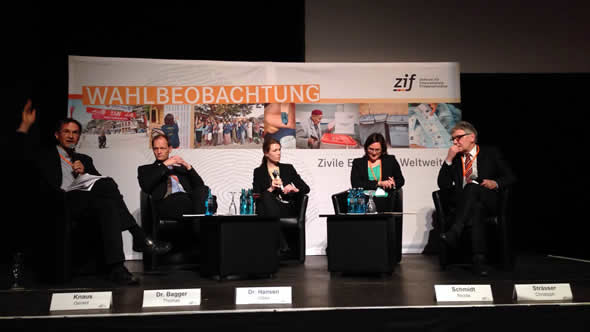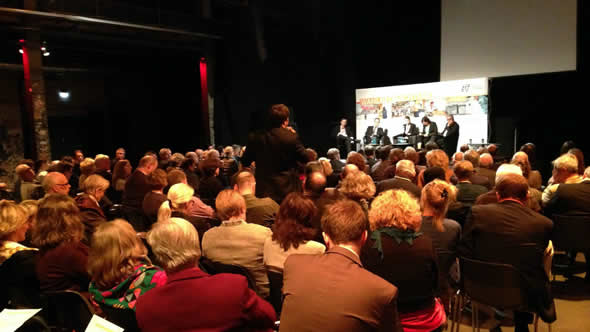Berlin – ESI at ZIF Election Monitoring Day

The Zentrum für Internationale Friedenseinsätze (Centre for International Peace Operations) organised an "Election Monitoring Day" in Berlin
ESI's Gerald Knaus participated in a panel debate on the future of election monitoring with a group of German election monitors in Berlin. The panel also featured Thomas Bagger, Head of the Policy Planning Staff of the German Foreign Office, Nicola Schmidt, Deputy Head of the OSCE/ODIHR Election Department, MdB Christoph Strässer, Commissioner for Human Rights Policy and Humanitarian Aid of the German government, and moderator Wibke Hansen, ZIF Director and Head Analyst.
At the event, Gerald made concrete suggestions based on ESI research. He emphasized the importance of strengthening ODIHR and explaining much more aggressively the difference between professional long-term missions and opinion-driven short term (political) missions. During the debate, Christoph Strässer agreed that it would be better to reduce parliamentary observer missions and strengthen professional long-term missions instead. Gerald added that parliamentarians should continue to monitor, but that they should not issue "delegation" assessments based on short-term visits. Furthermore, he recommended that ODIHR find ways to certify quality domestic monitoring organisations (while these retain their independence) to distinguish them from partisan outfits.
Thomas Bagger explained that Germany takes ODIHR very seriously and hopes its candidate for director will prevail. Gerald agreed, but also hopes that the German candidate for next secretary general of the Council of Europe succeeds, before that organisation is lost. Europe needs both a strong, independent ODIHR and a credible Council of Europe. Germany needs to take seriously the crisis of the Council of Europe and push, with allies, a club of concerned democrats, for serious reforms.
A distinction needs to be made between OSCE – which is evolving into a needed platform for debate between democracies and autocracies in Eurasia – and the Council of Europe, which is either a club of democracies or loses all legitimacy. The importance and legitimacy of election monitoring needs to be explained much better to wider public. A standard needs to be set below which no election in a Council of Europe member state must ever fall – e.g. evidence of any systematic ballot box stuffing would always fall short of such a standard.
- Agenda: 1. ZIF-Wahlbeobachtungstag
- Deutsche Welle, Nina Werkhäuser, "Observers take a critical look at elections" (20 April 2014)
- ESI report: Disgraced – Azerbaijan and the end of election monitoring as we know it (5 November 2013)
- ESI discussion paper: A Portrait of Deception Monitoring Azerbaijan or why Pedro Agramunt should resign (22 January 2013)
- ESI report: Caviar Diplomacy – How Azerbaijan silenced the Council of Europe (24 May 2012)

